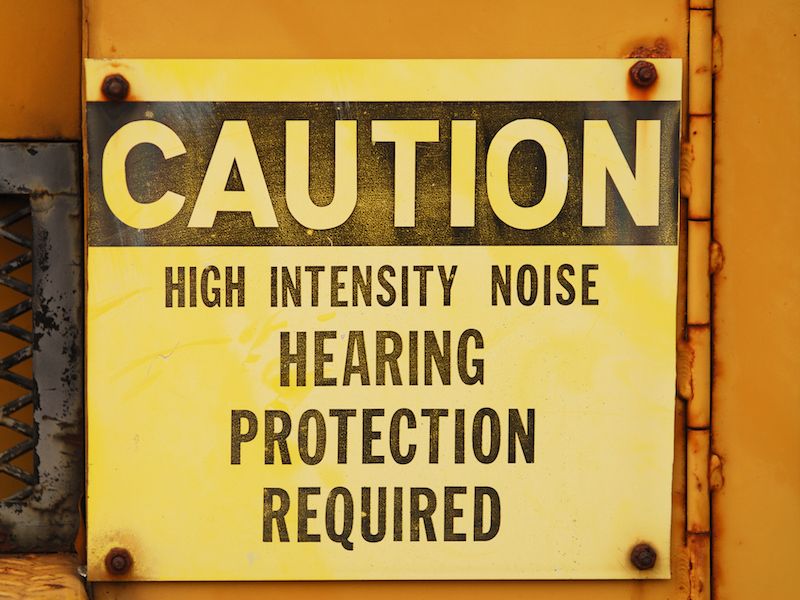
Understanding you should protect your ears is one thing. Recognizing when to protect your ears is another matter. It’s not as easy as, for example, determining when to use sunblock. (Is the sun out and will you be outdoors? Then you need sunblock.) It’s not even as simple as recognizing when to use eye protection (Handling dangerous chemicals? Doing some building? You need to wear eye protection).
When dealing with when to wear hearing protection, there seems to be a big grey area which can be dangerous. Unless we have specific knowledge that some place or activity is dangerous we tend to take the easy road which is to avoid the problem altogether.
Risk Assessments
In general, we’re not very good at assessing risk, especially when it comes to something as intangible as lasting hearing damage or loss of hearing. Let’s take some examples to demonstrate the situation:
- Person A attends a very loud rock concert. The concert lasts about 3 hours.
- Person B has a landscaping business. She spends a considerable amount of time mowing lawns, then she goes home to a quiet house and reads.
- Person C works in an office.
You may think that person A (let’s call her Ann, to be a little less formal) may be in more hearing danger. For the majority of the next day, her ears will still be screeching from the loud show. Presuming Ann’s activity was dangerous to her ears would be sensible.
Person B (let’s just call her Betty), on the other hand, is exposed to less noise. There’s no ringing in her ears. So her ears must be less hazardous, right? Well, not really. Because Betty is pushing that mower all day. So despite the fact that her ears don’t ring out with pain, the harm accrues bit by bit. Even moderate sounds, if experienced with enough frequency, can injury your hearing.
What’s occurring with person C (let’s call her Chris) is even tougher to sort out. Lawnmowers come with instructions that emphasize the hazards of persistent exposure to noise. But even though Chris works in a quiet office, she has a very noisy, hour-long commute every day through the city. Also, even though she works behind her desk all day, she listens to her music through earbuds. Is protection something she should consider?
When You Should be Concerned About Protecting Your Hearing
The normal rule of thumb is that if you need to raise your voice in order to be heard, your surroundings are loud enough to do harm to your hearing. And if your environment is that loud, you should think about using earmuffs or earplugs.
The cutoff needs to be 85dB if you want to get clinical. Noises above 85dB have the capacity to cause damage over time, so in those scenarios, you need to think about wearing ear protection.
Your ears don’t have a built-in sound level meter to notify you when you get to that 85dB level, so countless hearing specialists suggest obtaining special apps for your phone. You will be able to take the appropriate steps to protect your hearing because these apps will inform you when the noise is getting to a dangerous volume.
A Few Examples
Your phone may not be with you wherever you go even if you do download the app. So we may formulate a good standard with a few examples of when to safeguard our ears. Here we go:
- Listening to music with earbuds. OK, this doesn’t require protection but does require care. Whether your music is playing directly into your ears, how loud it’s playing, and how long you’re listening to it are all things you need to give consideration to. Consider getting headphones that cancel out outside sound so you don’t have to turn up the volume to damaging levels.
- Exercise: Your morning cycling class is a great example. Or perhaps your daily elliptical session. Each of these examples may call for hearing protection. The loud volume from instructors who use loud music and microphones for motivation, though it might be good for your heart rate, can be bad for your ears.
- Operating Power Tools: You know you will need hearing protection if you work all day in a factory. But how about the enthusiast building in his workshop? Even if it’s just a hobby, hearing specialists suggest wearing hearing protection if you’re working with power equipment.
- Every day Chores: We already discussed how something as simple as mowing the lawn, when done often enough, can necessitate hearing protection. Cutting the grass is a great example of the type of household job that may cause harm to your hearing but that you most likely won’t think about all that often.
- Driving & Commuting: Driving all day as an Uber or Lyft driver? Or maybe you’re just hanging out downtown for work or getting on the subway. The constant noise of living in the city, when experienced for 6-8 hours a day, can cause damage to your ears over the long haul, particularly if you’re cranking up your music to hear it over the commotion.
These illustrations might give you a suitable baseline. If there is any doubt, though, wear protection. Compared to leaving your ears exposed to future harm, in most cases, it’s better to protect your ears. If you want to be able to hear tomorrow, protect today.